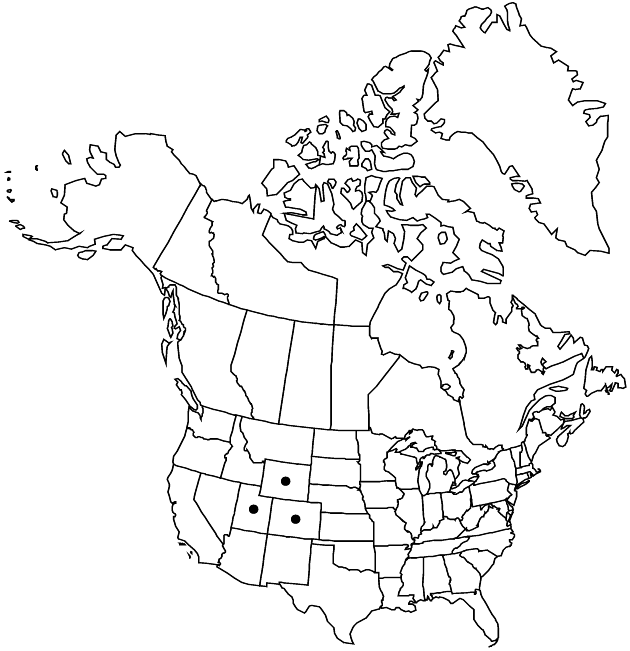Difference between revisions of "Pyrrocoma clementis"
Bull. Torrey Bot. Club 27: 625. 1900.
FNA>Volume Importer |
FNA>Volume Importer |
||
| Line 25: | Line 25: | ||
|distribution=w United States. | |distribution=w United States. | ||
|discussion=<p>Varieties 2 (2 in the flora).</p><!-- | |discussion=<p>Varieties 2 (2 in the flora).</p><!-- | ||
| − | --><p>Pyrrocoma clementis is recognized by its villous to tomentose stems, villous and ciliate phyllaries, and high elevation habitat, often well above tree-line. It is similar to P. uniflora, which has narrower heads, finer floccose-tomentose pubescence, and grows at lower elevations.</p> | + | --><p><i>Pyrrocoma clementis</i> is recognized by its villous to tomentose stems, villous and ciliate phyllaries, and high elevation habitat, often well above tree-line. It is similar to <i>P. uniflora</i>, which has narrower heads, finer floccose-tomentose pubescence, and grows at lower elevations.</p> |
|tables= | |tables= | ||
|references= | |references= | ||
| Line 60: | Line 60: | ||
|publication year=1900 | |publication year=1900 | ||
|special status= | |special status= | ||
| − | |source xml=https://jpend@bitbucket.org/aafc-mbb/fna-data-curation.git/src/ | + | |source xml=https://jpend@bitbucket.org/aafc-mbb/fna-data-curation.git/src/8f726806613d60c220dc4493de13607dd3150896/coarse_grained_fna_xml/V19-20-21/V20_952.xml |
|tribe=Asteraceae tribe Astereae | |tribe=Asteraceae tribe Astereae | ||
|genus=Pyrrocoma | |genus=Pyrrocoma | ||
Revision as of 15:28, 18 September 2019
Plants 3–18(–40) cm. Stems 1–5, ascending or decumbent, pale and often red-tinged, sparsely villous, sometimes tomentose. Leaves (persistent, thick, ± fleshy); basal petiolate, blades lanceolate to narrowly oblanceolate, 50–140 × 9–16 mm, margins usually entire, sometimes slightly undulate, sometimes denticulate, sparsely ciliate, apices acute to obtuse, faces usually glabrous, sometimes puberulent or villous, eglandular; cauline sessile, lanceolate to ovate, 20–40 × 5–10 mm, bases clasping, auriculate. Heads usually borne singly, terminal, sometimes 2–3 smaller proximally, not subtended by leaflike bracts. Peduncles 0.5–1 cm. Involucres broadly campanulate, 8–15 × 20–35 mm. Phyllaries in 3–4 series, green with white margins, sometimes yellowish, lanceolate to oblanceolate, 6–12 mm, unequal, margins entire, ciliate, apices obtuse to acute or acuminate, faces villous. Ray florets 21–55; corollas 10–18 mm. Disc florets 100+; corollas 6–8 mm. Cypselae subfusiform, not compressed, 4–7 mm, 4-angled, faces striate, sericeous or glabrous; pappi tawny, 6–8 mm.
Distribution

w United States.
Discussion
Varieties 2 (2 in the flora).
Pyrrocoma clementis is recognized by its villous to tomentose stems, villous and ciliate phyllaries, and high elevation habitat, often well above tree-line. It is similar to P. uniflora, which has narrower heads, finer floccose-tomentose pubescence, and grows at lower elevations.
Selected References
None.
Key
| 1 | Phyllaries narrowly obovate, abruptly acute; cypselae sericeous | Pyrrocoma clementis var. clementis |
| 1 | Phyllaries narrowly lanceolate, apices attenuate; cypselae glabrous | Pyrrocoma clementis var. villosa |